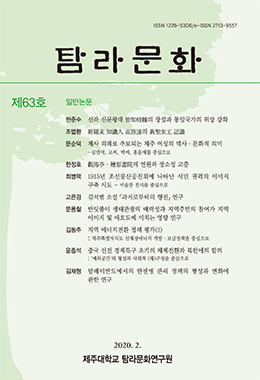제주도는 2008년부터 신재생에너지 개발보급을 주요내용으로 하는 카본프리 아일랜드 정책을 펼치고 있다. 전력거래소 자료에 따르면, 10년이 지난 2018년 말 기준으로 제주도내 신재생에너지 발전은 전체 발전량 대비 12.9%를 차지해 전국 평균보다 약 3배 높은 수준이었다. 얼핏 양호한 수준이라고 볼 수 있으나, 제주도가 2008년 이후 수 차례 발표해왔던 계량적 정책목표에는 못 미치고 있으며, 최근에는 전력계통 한계용량, 환경영향으로 인한 시민들의 우려, 입지지역의 주민수용성 문제 등으로 인해 신재생에너지 개발보급은 과거보다 쉽지 않은 상황이다. 또한 인구증가에 따라 전력소비량이 늘고 있어서 대규모 화력발전과 육지로부터 송전받는 전력에 대한 의존도가 증가하고 있다. 따라서 지역 에너지전환을 위해서는 과거와 같은 방식의 신재생에너지 개발ㆍ보급을 넘어, 기술적 문제를 해결하기 위한 대안을 마련하고, 전력시장 제도도 개선해야 한다. 이와 더불어 시민과 함께 할 수 있도록 거버넌스를 형성하고 교육ㆍ홍보를 지속해야 하며, 규정ㆍ조직ㆍ예산 등 제도적 기반을 유기적으로 운영하고, 타 지역 및 중앙정부와의 협력을 보다 강화해야 한다.
The purpose of this study is to analyze and evaluate local energy transition policy, focusing on renewable energy development projects in Jeju Special Self-Governing Province. Since 2008, Jeju local government has been promoting the “Carbon Free Island policy”, which focuses on developing renewable energy. As of the end of 2018, 10 years from the beginning of the policy, Jeju's renewable energy generation accounted for 12.9% of the total energy generation in Jeju, about three times higher than the national average. But developing renewable energy is not easy than in the past, because of the limits of powergrid capacity, citizen’s concerns about environmental impacts, and resident acceptability issue. Therefore, for the citizens' energy conversion, it is necessary not only developing renewable energy, but also for strengthening institutional framework such as regulation, organizations, budget to make more efforts to build a governance system and enhance energy citizenship.


